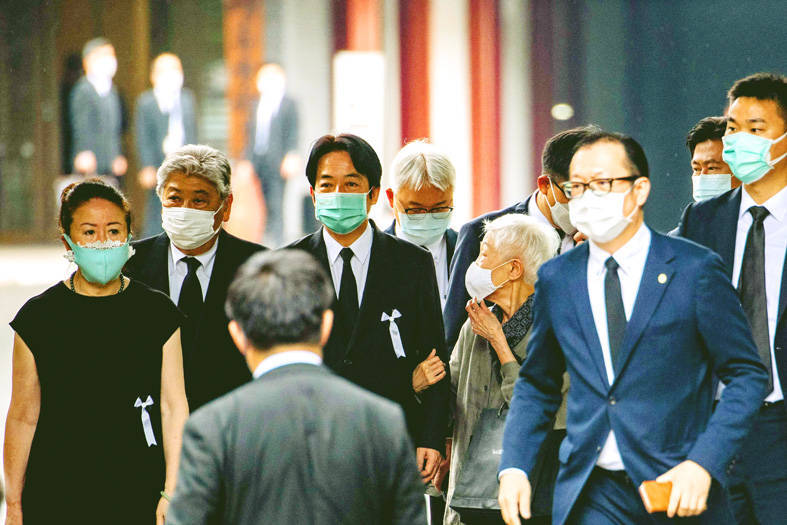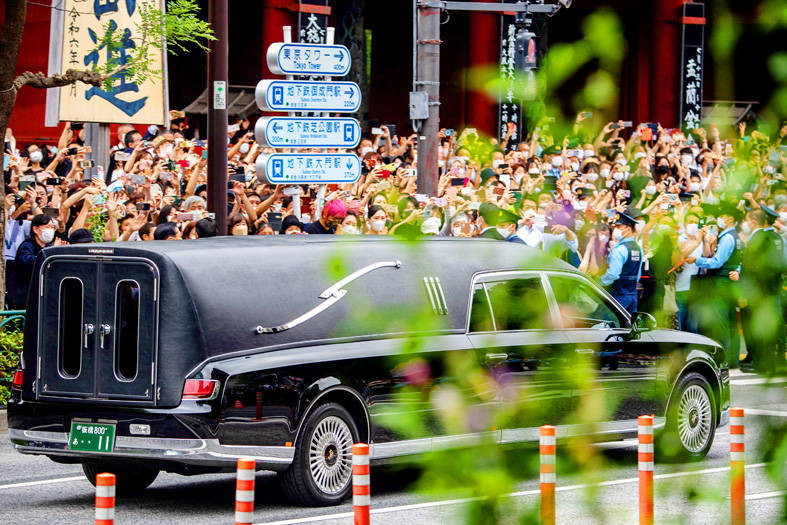《TAIPEI TIMES》Japan mourns as funeral for Abe held

Vice President William Lai, center, attends the funeral of former Japanese prime minister Shinzo Abe at the Zojoji temple in Tokyo yesterday. Photo: AFP
TAIWAN’S BEST FRIEND: Vice President William Lai attended the private funeral, drawing China’s ire, which said his visit was a ‘political trick that will not succeed’
AFP, TOKYO
Mourners yesterday lined the streets of central Tokyo to bid farewell to assassinated former Japanese prime minister Shinzo Abe, as his hearse was driven past political landmarks after a private funeral.
The nation’s longest-serving prime minister was gunned down on Friday while campaigning, in a crime that rattled Japan and prompted an outpouring of international condemnation and grief.
His funeral was held at Tokyo’s Zojoji temple, with relatives, foreign dignitaries and close acquaintances in attendance, including Vice President William Lai (賴清德).
Elsewhere in the temple compound, thousands of well-wishers lined up in the humid heat to pay their respects before a photograph of the late leader, who held office until 2020.
“I can’t get over my sadness, so I came here to lay flowers,” said consultant Tsukasa Yokawa, 41, describing Abe as “a great prime minister who did a lot to elevate Japan’s presence” globally.
After the service, a hearse carrying Abe’s body departed for a final tour of some of the political landmarks he served in: the parliament, the prime minister’s office and the headquarters of the ruling Liberal Democratic Party (LDP).
Residents gathered along the route, while staff and officials, including ministers and senior LDP figures, stood somberly outside each venue. They pressed their hands together and bowed their heads in respect as the car arrived.
Abe’s widow, Akie, sat in the front of the hearse — carrying her husband’s mortuary tablet inscribed with his posthumous Buddhist name — and bowed back.
Japanese Minister of Defense Nobuo Kishi, Abe’s brother, called the killing “an act of terrorism.”
“I’ve lost my brother. At the same time, Japan has lost an irreplaceable leader,” he wrote on Twitter yesterday. “My brother loved Japan and risked his life to be a politician and protect this nation.”
In a speech at the funeral, Japanese Deputy Prime Minister Taro Aso recalled drinking and playing golf with his close ally.
“You were supposed to read an eulogy for me. This is very painful,” he said, according to Japanese media.
Abe was campaigning in the western city of Nara when he was shot.
The murder suspect, 41-year-old Tetsuya Yamagami, is in custody and has told police he targeted Abe because he believed the politician was linked to an organization he resented.
Yamagami approached him from behind in broad daylight, in circumstances that have raised questions about security.
Japanese National Public Safety Commission Chairman Satoshi Ninoyu pledged to hold a full review of any security failings.
Japanese Minister of Foreign Affairs Yoshimasa Hayashi said that more than 1,700 condolence messages had been received from 259 countries, territories and international bodies.
On Monday, US Secretary of State Antony Blinken made an unscheduled stop in Tokyo to pay tribute to Abe, describing him as a “man of vision.”
Lai also traveled to Japan, attending a wake for Abe at a Buddhist temple in Tokyo on Monday evening and the private funeral at Zojoji yesterday.
He was scheduled to return to Taiwan last night.
Taiwanese and Japanese authorities have downplayed Lai’s visit, saying he had traveled to Tokyo in a personal capacity.
The Chinese Ministry of Foreign Affairs yesterday said its embassy in Japan had lodged “stern representations” with the government there about Lai attending the event, saying his visit to Japan was a “political trick that will not succeed.”
Hayashi told a press conference that Lai attended Abe’s funeral as a private citizen, adding that Tokyo’s policy toward Taipei had not changed.
In Taipei, Ministry of Foreign Affairs spokeswoman Joanne Ou (歐江安) said the ministry would not comment on Lai’s “private itinerary” in Tokyo.
Democratic Progressive Party (DPP) caucus director-general Cheng Yun-peng (鄭運鵬) said that while Taiwan and Japan have said that Lai visited Japan in a personal capacity, there is no doubt that his status as vice president makes him the envoy of Taiwan.
DPP caucus secretary-general Chen Ou-po (陳歐珀) added that Taiwan’s relations with Japan are deep-rooted and the two nations share a close bond — like close friends, or one might even say family.
That both Taiwan’s ruling and opposition parties have paid tribute to Abe shows that the late prime minister was Taiwan’s best friend and Taiwan-Japan relations are a very important link in the nation’s diplomatic policy, Chen said.
Additional reporting by CNA, Reuters and Hsieh Chun-lin
新聞來源:TAIPEI TIMES

People watch the hearse transporting the body of late former Japanese prime minister Shinzo Abe as it leaves Zojoji Temple in Tokyo yesterday. Photo: AFP

















